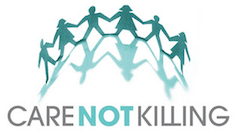Campaigners disappointed at 'divisive' BMA vote on euthanasia

Following yesterday's extremely close vote, 49% - 48% that sees the British Medical Association adopt a neutral stance on assisted suicide and euthanasia, Dr Gordon Macdonald, Chief Executive of Care Not Killing commented: "We are naturally disappointed at the divisive nature of this vote as it exposes the divide between doctors who care for patients at their end of life whether in hospitals or hospices, who oppose assisted suicide and euthanasia and those medics who work in unrelated discipline such as child and adolescent psychiatry and occupational health.
"As the BMA's own survey found doctors at the coal face, who deliver care to the elderly and terminally ill, who work in Palliative Care, Geriatric Medicine and General Practice continue to oppose assisted suicide and euthanasia, because they know it is not needed and the subtle pressure it could put on patients to end their lives prematurely.
"The doctors' group should have used this conference to find out why their members who are least likely to treat those with terminal and chronic conditions, such as medical students still training in universities are most likely to support assisted suicide and euthanasia. Is this simply a generational shift or a lack of understanding of the range of treatments available to palliative doctors?"
Dr Macdonald continued: "Was any consideration given to the concerns of those doctors who work with disabled people and elderly about the discriminatory message that singling out terminally ill and disabled people would send, the worrying link between legalising assisted suicide and euthanasia and increases in the suicide rate which we see in Oregon and the Netherlands or the erosion of so-called safeguards?
"We only have to look at Canada, which legalised so called 'physician assisted dying" in 2015, to see what can happen. This law which was originally limited to those with a foreseeable death, came into force in the summer of 2016.
"In September 2019, the Quebec Superior Court struck down the requirement that a natural death must be 'reasonably foreseeable'. This followed the case of Alan Nichols, a former school caretaker who was physically healthy, but struggled with depression. His life was ended by lethal injection in July. In the same year we saw the chilling case of Roger Foley, who was repeatedly offered the drugs to kill himself, while being denied the social care to live a dignified life, due to the cost.
"At the same time, deaths from lethal injection continue to rise. In 2020 7,595 had their lives ended this way, including 1412 who cited loneliness as a reason for opting to be killed, no doubt this was compounded by COIVID.
"The rapid extension of Canadian law to those with chronic disease, mental health problems and disability shows the fallacy of trusting in proposed legal safeguards and how only safe system is the one we currently have - a complete prohibition on state sanctioned killing."
Dr Macdonald concluded: "The BMA now finds itself out of step with medical organisations such as the World Medical Association (WMA) which has recently reiterated its opposition to euthanasia and physician-assisted suicide saying, 'No physician should be forced to participate in euthanasia or assisted suicide, nor should any physician be obliged to make referral decisions to this end…'.
"Our current laws protect vulnerable people and do not need changing, instead we need to refocus our attention on how to ensure we provide the very best palliative care to those who need it."
LINK
Care Not Killing - www.carenotkilling.org.uk/


















